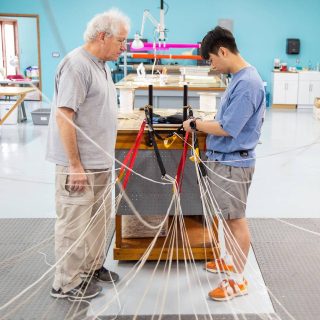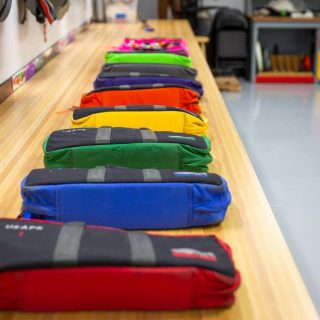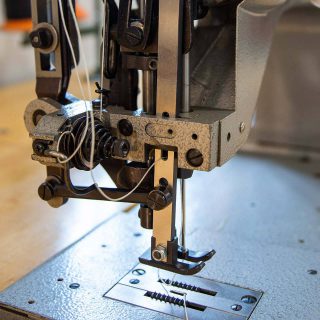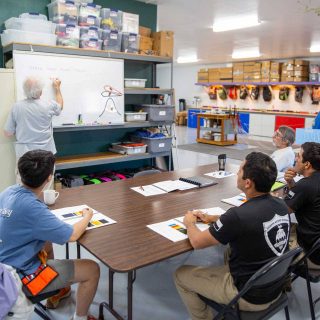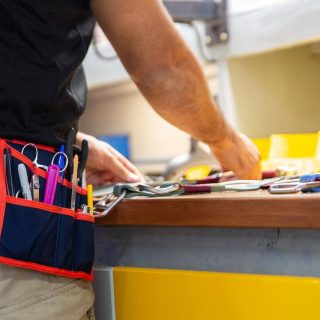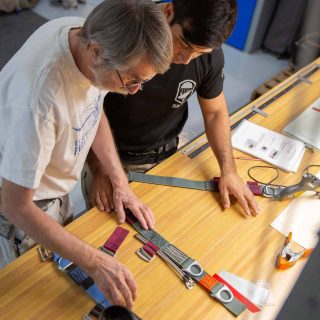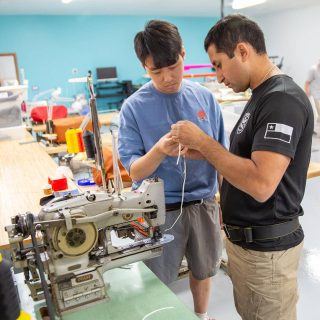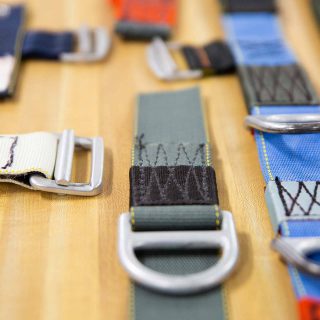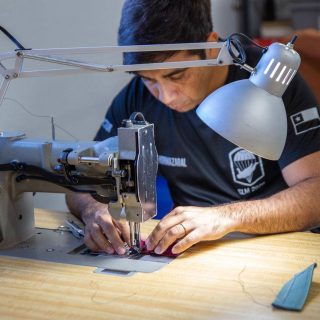Frequently Asked Questions
More Information
How can we help?
If you don’t see the answer to your question here, get in touch. The only thing we enjoy as much as hands-on rigging is talking about our trade! We are here to support you.
What are the minimum FAA certification requirements?
According to FAA regulations, to be eligible for a parachute rigger certificate, a person must:
- Be at least 18 years of age
- Be able to read, write, speak, and understand the English language
What forms of ID are acceptable to prove age and residence?
Candidates must be at least 18 years old to enroll in USAPR programs. Valid identification is required to prove age as well as place of residence. Identification must include a photo, date of birth, signature and physical residential address (post office boxes and route numbers are not permitted). Candidates can produce more than one document in order to fulfill this requirement. Acceptable documentation includes:
Proof of Age: US Citizens & Permanent Residents
- State ID
- Driver’s License
- Government ID Card
- Military ID Card
- Passport
- Green Card
Proof of Age: Non-US Citizens
- Government ID Card
- Military ID Card
- Passport
Proof of Residence: All Candidates
- Utility Bill
- Rental Agreement
- Mortgage Statement
What is the difference between the civilian and military personnel training you offer?
There is no difference.
In the early days of recreational skydiving, jumpers made use of surplus military parachutes and gear. Over time, the tables have turned somewhat. Innovations introduced into the field by civilian skydivers have proven valuable to the military, and today the military utilizes a lot of non-standard equipment – essentially sport skydiving equipment that has been militarized.
Not only is the training and testing the same for all riggers, but the opportunity for military personnel to earn FAA certification is advantageous to career progression.
What are the prerequisites for attending USAPR?
Prerequisites differ for each course. See the course descriptions for detailed information:
What proof is required for packing experience?
Civilian candidates must present their logbooks. Each logbook entry used toward the required number of packs must include the date and place, the owner’s name and address, the parachute make and serial number and type, and a description of work performed (typically “Inspect and Repack”). If the rigger is not rated for that type of parachute, the entry must be signed off by the supervising FAA rigger.
Military candidates without a rigger logbook must present an original letter on unit letterhead signed in ink or digitally by the Commander as proof of experience.
What should be included in my Commander’s letter regarding my packing experience?
Sample letters are available to download and edit for military candidates:
Each letter includes language that certifies packing experience and specific training, and attests that the candidate is recommended for USAPR course enrollment. Annotations are included to ensure all required information is captured.
Prior to signature and submission, ensure all fields are accurately completed and that all annotations have been deleted. Note, the letter must be signed in ink or via digital signature by the Commander, not just the first-line supervisor.
What is a digital signature?
A digital signature is one generated by the signer via a reputable digital signature tool, such as Adobe Sign, IdenTrust, Appligent, or DocuSign. An image, such as a jpeg, is not acceptable in lieu of a legitimate digital signature.
Can you help me get to the number of supervised reserve packs I need?
Yes, Master and Senior rigger candidates needing additional time to practice the required skills or complete the number of packs for a certificate may opt into one or both days of Saturday School. There is an additional $250 per day fee, and arrangements can be made as late as the day prior.
Can I count ejection seat packs to meet the minimum number of packs required?
No. Only back, chest and seat type packs can be counted toward pack minimums.
Can I count ultralight reserve parachutes toward the packs I need for a Senior Rigger certificate?
No. Only FAA-approved parachutes count.
When are courses offered?
USAPR annually offers parachute rigging courses between September and April. See our calendar for Senior Rigger and Master Rigger course availability. Advanced Skills and Additional Ratings courses and No-Instruction Testing are booked by appointment only.
How much do courses cost?
Tuition and fees differ by course:
- Senior Rigger | Tuition $3,000, plus:
- FAA Written Test – $250
- FAA Oral & Practical Test (Back Rating) – $250 (waived for military applicants)
- Master Rigger | Tuition $3,000, plus:
- FAA Written Exam (if not Senior Rated) – $250
- FAA Oral & Practical Exam (2 Ratings) – $450
- Advanced Skills | Tuition $1,000
- Additional Ratings | Tuition $1,000, plus:
- FAA Practical Test (One Additional Rating) – $250
- No-Instruction Testing | See test fees above
How many people are in each course?
Depending on the core competency of each session’s candidates, our ratio is either one instructor to two students or one to three.
Is travel and accommodation included in the tuition?
No, travel and accommodation costs are the responsibility of individual candidates. Contact us if you need suggestions for nearby options – and be sure to make your reservations early.
How do I enroll in a course?
Enrolling in a course is easy. Check the course calendar and complete an application form. Payment is not required to apply. Applicants will be sent an invoice after they have been accepted into the program. See the Enroll page for more information.
We annually offer Master Rigger and Senior Rigger courses between September and April. Advanced Skills and Additional Ratings courses and No-Instruction Testing are booked by appointment only.
How do I withdraw from a course I’m already enrolled in?
Cancellation of enrollment and a refund request must be submitted in writing:
- No penalty is applied for a reservation cancelled more than 60 days prior to the start of a course.
- A penalty fee of $1,000 is applied to a reservation cancelled less than 60 days but more than 45 days prior to the start of a course.
- A reservation cancelled less than 45 days prior to the start of a course is not eligible for a refund in any amount.
- Approved refunds are processed within 14 days of written notice.
How do I reschedule a course I’m already enrolled in?
Rescheduling requests must be submitted in writing:
- No fee is applied for a rescheduled reservation made more than 60 days prior to the start of the course.
- A one-time fee of $500 is applied for a rescheduled reservation made less than 60 days prior to the start of the course.
- Candidates must book a rescheduled course within 12 months of the initial course.
Is a written exam required?
If you do not already have an FAA rigger certificate, you must take a written exam. The standard exam is 50 multiple-choice questions. Military riggers applying for Senior Certificates can take a 25-question exam on just regulations instead.
No exam is required If you are already an FAA rigger. This will be the case if you are a Senior Rigger applying for Master, or a rigger applying for an add-on rating.
Are oral and practical exams required?
Yes, Senior and Master Rigger candidates pass oral and practical exams.
After successfully completing the FAA written exam, all civilian candidates and military Master Rigger candidates are required to complete the relevant oral and practical test(s). Exams are administered by an FAA Designated Parachute Rigger Examiner (DPRE).
Although military candidates seeking the FAA Senior Rigger certificate are not required to take an oral and practical test, at USAPR we administer an equivalent oral and practical test. Our aim is to produce the best riggers in the industry.
I'm not in the US. I have all the required experience and just need to take the test. Can you do a test outside the US?
Technically yes, but practically no. You need to appear in person at an FAA Flight Standards District Office (FSDO) to get authorization to test, which means you have to come to the US anyway. There are no FAA Rigger Examiners based outside the US.
How should I prepare for the course I am signed up for?
For Senior Rigger candidates, pack reserve chutes. The more entries you have in your logbook, the fewer you will need to pack during the course to get to the 20 you need – which means more time to practice other skills.
For all candidates with access to sewing machines, practice sewing. We will ask you to bring a sample basic patch with you. Master Rigger candidates should come with at least Senior Rigger skills. Senior Rigger candidates should do their best.
For candidates without FAA Senior Rigger certificates, study for the written test. The best written test prep app is from Dauntless Aviation. The iOS and Android versions are good, and the Mac and PC versions are excellent. Dauntless does an excellent job of keeping up with the current pool of questions, and their explanations are very clear. Well worth the money. (And, no, we don’t make a cut for our recommendation.)
I want to get certified to repair paragliders/parasails/powered parachutes. Which course should I sign up for?
Unfortunately, none of ours. Although these are all ram-air wings, the materials, construction, and repair techniques are different from those found in parachutes. The manufacturer of your powered parachute, parasail or paraglider may be able to point you in the right direction.
What are the FAA rating types?
- Back
- Chest
- Seat
- Lap (Not available at USAPR)
What is the daily schedule?
Master and Senior Rigger courses are both 15 days in duration. We are in class Monday through Friday, sometimes including traditional holidays. We take weekends off, unless a candidate needs Saturday School to complete the number of required packs or develop needed skill proficiencies.
- Morning Session: 0745 to 1200 hrs
- Lunch break: 1200 to 1300 hrs
- Afternoon Session: 1300 to 1700 hrs
Each day begins with a multiple-choice quiz in preparation for the written test, followed by an oral quiz in preparation for the oral test. These are followed by lectures, demonstrations and hands-on rigging tasks. At each day’s conclusion, candidates gather for a daily debrief.
What is the dress code?
USAPR has no dress code requirements. Candidates should wear comfortable clothing and shoes that are appropriate to the season and the work environment, including packing on the floor. Feel free to bring your own knee pads.
What do I need to bring?
Other than a basic patch described at the time of enrollment, candidates are not required to bring any equipment, tools, materials or supplies to the training. A complete rigger tool kit is provided for the duration of the course. Candidates are welcome to bring knee pads.
Can you hold a course at my site in the US?
Let us know what you need. If you just need to learn more about packing and maintaining your equipment, then probably yes. If you were hoping for FAA Rigger certificates, then probably not.
